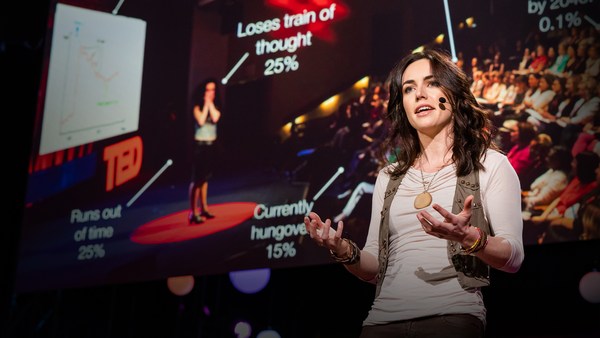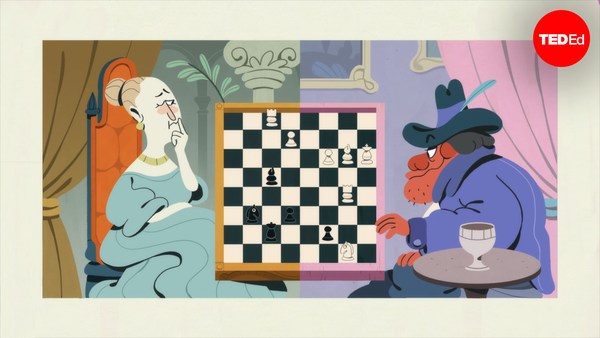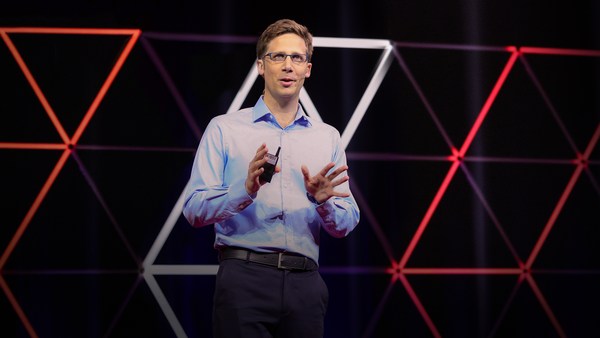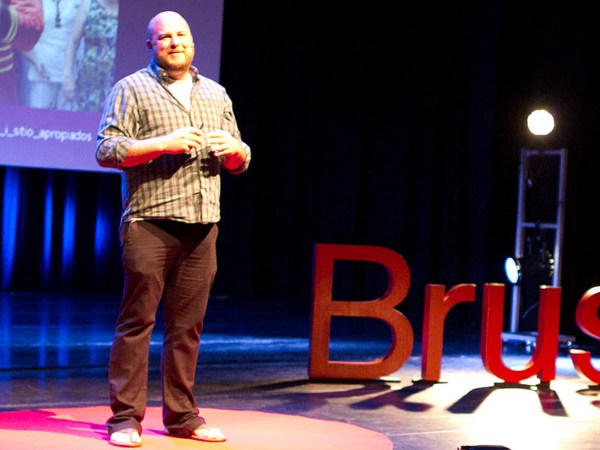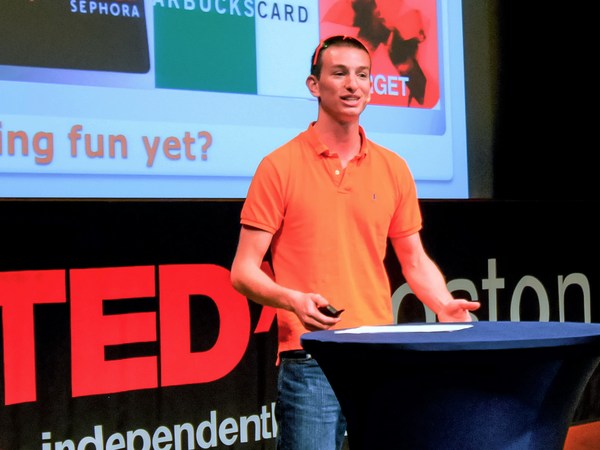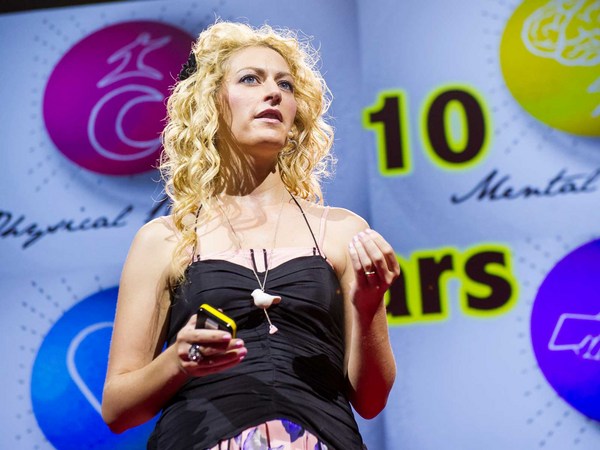I am obsessed with forming healthy communities, and that's why I started Twitch -- to help people watch other people play video games on the internet.
(Laughter)
Thank you for coming to my TED talk.
(Laughter)
So in seriousness, video games and communities truly are quite related. From our early human history, we made our entertainment together in small tribes. We shared stories around the campfire, we sang together, we danced together. Our earliest entertainment was both shared and interactive. It wasn't until pretty recently on the grand scale of human history that interactivity took a back seat and broadcast entertainment took over.
Radio and records brought music into our vehicles, into our homes. TV and VHS brought sports and drama into our living rooms. This access to broadcast entertainment was unprecedented. It gave people amazing content around the globe. It created a shared culture for millions of people. And now, if you want to go watch or listen to Mozart, you don't have to buy an incredibly expensive ticket and find an orchestra. And if you like to sing -- (Sings) I can show you the world -- then you have something in common with people around the world. But with this amazing access, we allowed for a separation between creator and consumer, and the relationship between the two became much more one-way. We wound up in a world where we had a smaller class of professional creators and most of us became spectators, and as a result it became far easier for us to enjoy that content alone.
There's a trend counteracting this: scarcity. So, Vienna in the 1900s, was famous for its café culture. And one of the big drivers of that café culture was expensive newspapers that were hard to get, and as a result, people would go to the café and read the shared copy there. And once they're in the cafe, they meet the other people also reading the same newspaper, they converse, they exchange ideas and they form a community. In a similar way, TV and cable used to be more expensive, and so you might not watch the game at home. Instead you'd go to the local bar and cheer along with your fellow sports fans there. But as the price of media continues to fall over time thanks to technology, this shared necessity that used to bring our communities together falls away. We have so many amazing options for our entertainment, and yet it's easier than ever for us to wind up consuming those options alone. Our communities are bearing the consequences. For example, the number of people who report having at least two close friends is at an all-time low. I believe that one of the major contributing causes to this is that our entertainment today allows us to be separate.
There is one trend reversing this atomization of our society: modern multiplayer video games. Games are like a shared campfire. They're both interactive and connecting. Now these campfires may have beautiful animations, heroic quests, occasionally too many loot boxes, but games today are very different than the solitary activity of 20 years ago. They're deeply complex, they're more intellectually stimulating, and most of all, they're intrinsically social.
One of the recent breakout genres exemplifying this change is the battle royale. 100 people parachute onto an island in a last-man-standing competition. Think of it as being kind of like "American Idol," but with a lot more fighting and a lot less Simon Cowell. You may have heard of "Fortnite," which is a breakout example of the battle royale genre, which has been played by more than 250 million people around the world. It's everyone from kids in your neighborhood to Drake and Ellen DeGeneres. 2.3 billion people in the world play video games. Early games like "Tetris" and "Mario" may have been simple puzzles or quests, but with the rise of arcades and then internet play, and now massively multiplayer games of huge, thriving online communities, games have emerged as the one form of entertainment where consumption truly requires human connection.
So this brings us to streaming. Why do people stream themselves playing video games? And why do hundreds of millions of people around the world congregate to watch them? I want you all the imagine for second -- imagine you land on an alien planet, and on this planet, there's a giant green rectangle. And in this green rectangle, aliens in matching outfits are trying to push a checkered sphere between two posts using only their feet. It's pretty evenly matched, so the ball is just going back and forth, but there's hundreds of millions of people watching from home anyway, and cheering and getting excited and engaged right along with them. Now I grew up watching sports with my dad, so I get why soccer is entertaining and engaging. But if you don't watch sports, maybe you like watching "Dancing with the Stars" or you enjoy "Top Chef." Regardless, the principle is the same. If there is an activity that you really enjoy, you're probably going to like watching other people do it with skill and panache. It might be perplexing to an alien, but bonding over shared passion is a human universal.
So gamers grew up expecting this live, interactive entertainment, and passive consumption just doesn't feel as fulfilling. That's why livestreaming has taken off with video games. Because livestreaming offers that same kind of interactive feeling. So when you imagine what's happening on Twitch, I don't want you to think of a million livestreams of video games. Instead, what I want you to picture is millions of campfires. Some of them are bonfires -- huge, roaring bonfires with hundreds of thousands of people around them. Some of them are smaller, more intimate community gatherings where everyone knows your name.
Let's try taking a seat by one of those campfires right now. Hey Cohh, how's it going?
Cohh: Hey, how's it going, Emmett?
ES: So I'm here at TED with about 1,000 of my closest friends, and we thought we'd come and join you guys for a little stream.
Cohh: Awesome! It's great to hear from you guys.
ES: So Cohh, can you share with the TED audience here -- what have you learned about your community on Twitch?
Cohh: Ah, man, where to begin? I've been doing this for over five years now, and if there's one thing that doesn't cease to impress me on the daily, it's just kind of how incredible this whole thing is for communication. I've been playing games for 20 years of my life, I've led online MMO guilds for over 10, and it's the kind of thing where there's very few places in life where you can go to meet so many people with similar interests. I was listening in a bit earlier; I love the campfire analogy, I actually use a similar one. I see it all as a bunch of people on a big couch but only one person has the controller. So it's kind of like a "Pass the snack!" situation, you know? 700 people that way -- but it's great and really it's just --
ES: So Cohh, what is going on in chat right now? Can you explain that a little bit to us? Because my eyesight isn't that good but I see a lot of emotes.
Cohh: So this is my community; this is the Cohhilition. I stream every single day. I actually just wrapped up a 2,000-day challenge, and as such, we have developed a pretty incredible community here in the channel. Right now we have about 6200 people with us. What you're seeing is a spam of "Hello, TED" good-vibe emotes, love emotes, "this is awesome," "Hi, guys," "Hi, everyone." Basically just a huge collection of people -- huge collection of gamers that are all just experiencing a positive event together.
ES: So is there anything that -- can we poll chat? I want ask chat a question. Is there anything that chat would like the world, and particularly these people here with me at TED right now, to know about what they get out of playing video games and being part of this community?
Cohh: Oh, wow. I am already starting to see a lot of answers here. "I like the good vibes." "Best communities are on Twitch."
(Laughter)
"They get us through the rough patches in life." Oh, that's a message I definitely see a lot on Twitch, which is very good. "A very positive community," "a lot of positivity," which is pretty great.
ES: So Cohh, before I get back to my TED talk, which I actually should probably get back to doing at some point --
(Laughter)
Do you have anything else that you want to share with me or any question you wanted to ask, you've always wanted to get out there before an audience?
Cohh: Honestly, not too much. I mean, I absolutely love what you're doing right now. I think that the interactive streaming is the big unexplored frontier of the future in entertainment, and thank you for doing everything you're doing up there. The more people that hear about what you do, the better -- for everyone on here.
ES: Awesome, Cohh. Thanks so much. I'm going to get back to giving this talk now, but we should catch up later.
Cohh: Sounds great!
(Applause)
ES: So that was a new way to interact. We could influence what happened on the stream, we could cocreate the experience along with him, and we really had a multiplayer experience with chat and with Cohh. At Twitch, we've started calling this, as a result, "multiplayer entertainment." Because going from watching a video alone to watching a live interactive stream is similar to the difference between going from playing a single-player game to playing a multiplayer game. Gamers are often as the forefront of exploration in new technology. Microcomputers, for example, were used early on for video games, and the very first handheld, digital mass-market devices weren't cell phones, they were Gameboys ... for video games. And as a result, one way that you can get a hint of what the future might hold is to look to this fun, interactive sandbox of video games and ask yourself, "what are these gamers doing today?" And that might give you a hint as to what the future is going to hold for all of us.
One of the things we're already seeing on Twitch is multiplayer entertainment coming to sports. So, Twitch and the NFL teamed up to offer livestreaming football, but instead of network announcers in suits streaming the game, we got Twitch users to come in and stream it themselves on their own channel and interact with their community and make it a real multiplayer experience. So I actually think that if you look out into the future -- only hundreds of people today get to be sports announcers. It's a tiny, tiny number of people who have that opportunity. But sports are about to go multiplayer, and that means that anyone who wants to around the world is going to get the opportunity to become a sports announcer, to give it a shot. And I think that's going to unlock incredible amounts of new talent for all of us. And we're not going to be asking, "Did you catch the game?" Instead, we're going to be asking, "Whose channel did you catch the game on?" We already see this happening with cooking, with singing -- we even see people streaming welding. And all of this stuff is going to happen around the metaphorical campfire.
There's going to be millions of these campfires lit over the next few years. And on every topic, you're going to be able to find a campfire that will allow you to bond with your people around the world. For most of human history, entertainment was simply multiplayer. We sang together in person, we shared news together in the town square in person, and somewhere along the way, that two-way conversation turned into a one-way transmission. As someone who cares about communities, I am excited for a world where our entertainment could connect us instead of isolating us. A world where we can bond with each other over our shared interests and create real, strong communities. Games, streams and the interactions they encourage, are only just beginning to turn the wheel back to our interactive, community-rich, multiplayer past.
Thank you all for sharing this experience here with me, and may you all find your best campfire.
(Applause)
